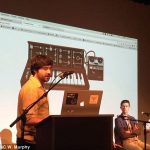 Late last year I wrote about an interesting project from the US Defense Department to create a robotic jazz player. They developed a machine that is capable of performing a trumpet solo after picking up cues from fellow (human) musicians.
Late last year I wrote about an interesting project from the US Defense Department to create a robotic jazz player. They developed a machine that is capable of performing a trumpet solo after picking up cues from fellow (human) musicians.
“The goal of our research is to build a computer system and then hook it up to robots that can play instruments, and can play with human musicians in ways that we recognize as improvisational and adaptive,” the researchers say.
At the heart of this kind of project is a big data fueled pattern match, whereby machines learn what to do next by studying huge numbers of previous examples from human musicians.
AI musicians
A similar project has been undertaken by researchers at Google. The project, called Magenta, uses a similar neural network based approach to help develop increasingly interesting and complex musical works.
The platform is interesting because it works with musicians to help collaborate on new music. The human taps in a number of notes into the virtual synthesizer, and the software is then capable of building on this beginning to create a more complete tune. It extrapolates this based upon the structure of some 4,500 popular tunes contained in its database.
The software is capable of making key changes and the like in the right places because it utilizes attention to extract the right information from the tunes in its database. Couple this with the kind of reinforcement learning Google exhibited so successfully in AlphaGo, and you have a good chance to progress beyond ‘mere’ pattern recognition towards something more independently creative.
Suffice to say, the early examples from Magenta, such as the tune embedded above, are somewhat simple affairs, but the team are confident that they can produce more complex works as they continue to develop the algorithms.
To help achieve this, the team have released the code behind Magenta on GitHub to try and entice other developers and researchers to join the project. There have already been numerous attempts to develop more ‘creative’ AI, whether in natural language or works such as this by Magenta, so it will be fascinating to see where researchers can take this project.